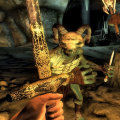These are some of the most common types that we have encountered in our daily work. After all, we are gamers ourselves, The Casuals. A casual player can be someone who simply plays on a lower difficulty than others. While the most dedicated player plays The Witcher III on the highest difficulty and tries to complete the game at 100%, the casual player spends time collecting herbs, killing any beast that stands in their way, and enjoying the rich open world and amazing story.
We all know the online gamer. Someone who plays games like World of WarCraft or Overwatch for hours. These players take pride in their gaming experience and often bring their skills to the rest of the world through player-versus-environment and player-versus-player forms of play. RuneScape is another great example of a game that encouraged the online gamer.
RuneScape offered a free, comprehensive and casual online role-playing experience. Every game played by the supercompetitive player is the most important battle he has ever fought, and he is simply unable to accept a defeat, especially when playing against friends. They will demand the best of three. Then, as many as necessary to win, or, until they see that they have no chance of winning, at which point they will completely lose interest in the game or return to their lair and hone their skills endlessly to prepare for next week's rematch.
Each of us knows a Backseat Gamer. When they're playing with their friends and it's time for Backseat Gamer to play, they refuse to take control and instead are content to give shouting instructions and criticism. The Backseat Gamer knows that he is not a particularly good player and, therefore, he likes to see others play and contribute MST3K-style comments. If the Backseat player joins in the middle of a session, he'll be full of distracting questions about the gameplay, story, characters, and mission you're currently trying to fulfill.
The more chaos ensues, the more delighted the Backseat player will be. The defining characteristic of the player is that playing alone is not enough emotion for him. There has to be something at play for them to actually get into the game, regardless of what that something is. Whether it's betting lunch money, a slap in the face, shaving the loser's eyebrows or the ever-popular bet of “eating something disgusting”, the player needs that extra motivation to bring out his best game.
Whether it's because of fear of punishment or because of the voyeuristic thrill of seeing their opponent pay the price of losing, they flourish whenever there's something at stake. Old-school gamers usually have older consoles running, such as Atari, Nintendo or Sega Genesis, with dozens of titles and accessories, such as Power Gloves and Light Zappers. Anything that doesn't have a correct retro style is simply not good. The main concern of The Destructive Gamer is not to win the game, but how he wins it.
An absolute force of nature, the main objective of the Destructive Gamer is to destroy everything and everyone who crosses their path, leaving their characteristic path of ruin wherever they go. If you can be injured, killed, destroyed or exploited, you can count on the Destructive Gamer to take care of it, regardless of whether you are busy with another pending task, that can wait. There is nothing that brings this player more joy than discovering creative ways to put an end to the competition, whether with AI in single-player mode or with real-life competitors in online multiplayer. Like Destructive Gamer, Trophy Hunter Gamer also has other more important priorities besides winning the game.
Primarily, they want to find and win everything the game has to offer. While trophy hunter players usually do their best to get all the unlockable items and special equipment, cheaters take advantage of cheat codes, loopholes or errors to get it, in addition to buying them directly from others when possible. Puzzle players enjoy games they can decipher. Their favorite games may be more complex, as they like to analyze how the game works and use that understanding to maximize efficiency and find the ideal move.
Unfortunately, this desire to discover and “solve” the game means that they will be less likely to enjoy games with elements of chaos and randomness. Bosses like it when they can be in control. They often know what is the best move for each player and have no qualms about telling players what their move should be. They usually like to play several times to discover the best possible moves.
They also enjoy cooperative games in which they can direct each player to a common goal. Unfortunately, they can have a bad experience when other players reject or reject their suggestions. In addition, other players can get angry when bosses constantly tell them what to do. Omni-Gamers are the type of players who enjoy a little bit of everything.
They rarely reject a work and will usually try to have a good time with anything. The downside of an omnicamer player is that, while they may show all the positive traits of other players, they can also have a bad experience for any of the above reasons. Indifferent players may not even identify themselves as players. They rarely volunteer to play, and they may need a little convincing to even give a game a chance.
In any case, they still usually end up having a good time. Getting indifferent players to play new games can be difficult, as they may resist trying new things. For this reason, gateway games or games with interesting themes generally work better. This explains the behavior of many different players and could further help you decide what type of gaming environment you want to promote in your own game.
If you've ever tried to achieve a 100% completion rate in a game, you most likely have the makings of a Bartle-type winner. With that said, we've identified some basic types of video game personalities that we see all the time. Having a clearer idea of the types of players that populate certain online games and communities, incorporating it as a factor in game design is crucial in some cases. If you can find a game, usually an MMORPG, that brings together all these types of players, you'll mostly have a living, living world full of unique personalities.
These questions, with binary answers, are framed to determine which of the 4 types of players you most identify with. A diagram containing four sections, each with different categories, shows which of Bartle's types is a player. From how you approach games in general, to the type of games you like and how you play them, to the time you spend playing them, there are dozens of features that can be used to differentiate different types of players. They don't like to earn a lot of experience points and gold, so open world games with the least restrictions are more of their kind.
It seems that role-playing games are the types of games that often contain Bartle's entire taxonomy of player types. They often get tired of certain types of games and rush to leave a game if it starts to feel like a job interacting with it. Of all the players, I would like nothing more than to relax in a tavern with my friend bard and talk about the latest gossip and treasures from the gaming world. Of the 4 types of players, assassins are provocative agents who just want to see the game world burn, laugh (and receive benefits) while doing so.
. .







Leave Reply